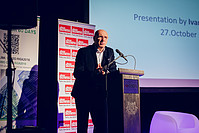Last year, Estonian and Lithuanian GDP per capita stood at 74% of the 28-member EU average and Latvia’s at 64%.
Godmanis said the Baltics would have to find “some very interesting and specific ways” to reach the average European level, or get through from 75% to 100%. “If we don’t catch up with the European average soon, more people will leave the Baltic States,” he warned.
Godmanis said he was confused as to why the European Commission would forecast unemployment to grow in Estonia from 6.5% this year to 7.7% in 2017. “I don’t understand why the European Commission expects Estonia’s unemployment to increase while it is falling in the other two Baltic economies. I place more trust in the IMF, which forecasts unemployment to fall in Estonia,” commented Godmanis in highlighting the differences between the forecasts of the two organisations.
The problem in Latvia and Lithuania, on the other hand, is that no one really knows how many people are working abroad. In Latvia, estimates range between 200,000 and 500,000. Estonia, on the other hand, has a helpful employment register which monitors Estonians working in Finland, as well as Finns working in Estonia.
Two things can be done in order to catch up with Europe, according to Godmanis: developing exports and increasing investment. The problem is, however, that the only guaranteed investments in the Baltics are European funds, and the Baltic nations are so poor at absorbing these funds that Lithuania is even slower than the EU average.
“During the crisis, someone began to calculate how much our GDP might increase if we use up all the money that is coming from EU funds,” remarked the former prime minister. “I don’t believe in these numbers, but I can tell you that we are very poor at absorbing the funds.”
Regarding Russia, Godmanis was absolutely clear that no exporters should reply on this market any time soon. “Russia will be closed for a very long time! European guys are thinking of isolation policy, and there is much evidence to support this,” he added.
Ivars Godmanis was the first Latvian prime minister after the country regained its independence from the Soviet Union. He led the country’s economic transition and is known as the man who was not afraid to take tough decisions at the cost of his own popularity. He has a PhD in physics, and is also known as a drummer and DJ.



